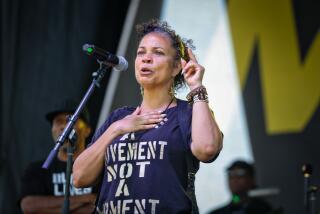Witness recalls demo in âhow to slit a throatâ as terror trial opens
NEW YORK -- On a ranch in rural Oregon, a radical Muslim holding a dagger with a curved blade yanked back the head of a kneeling young man and brought the metal to his neck.
âHe said he was going to show us how to properly slice someoneâs throat,â the kneeling manâs sister testified Thursday as prosecutors began presenting their case against an Egyptian-born imam known as Abu Hamza Masri, the latest terrorism case to unfold in a New York federal court.
Masri, who also goes by Mustafa Kamel Mustafa, was not the man holding the knife, but a government indictment alleges that he sent the knife-wielding man from London to Oregon to establish a terrorist training camp.
It is one of 11 charges against Abu Hamza Masri, a naturalized British citizen who gained fame for his radical sermons in Londonâs Finsbury Park mosque and who was extradited to the United States in October 2012.
The defendant, who says he lost both arms fighting in Afghanistan, faces life in prison if convicted on the most serious charges of hostage-taking and conspiracy to take hostages, stemming from the December 1998 abduction of 16 tourists in Yemen.
Other charges include providing material support to terrorists and conspiring to support terrorists by sending men and money to set up the camp outside Bly, Ore., a remote hamlet about 300 miles southeast of Portland.
Masri, 55, pleaded not guilty, and in opening statements Thursday, defense attorney Joshua Lewis Dratel said Masri was being prosecuted not for his actions but for voicing controversial opinions.
âHe wasnât in Yemen, wasnât in Oregon, never harmed Americans or anyone else,â Dratel said as Masri sat quietly, his short-sleeved tunic revealing arms cut off just below the elbows.
âHeâs said a lot of harsh things ... anti-U.S., anti-Israel, anti-West,â Dratel said. âThese are views, not acts. This is expression, not crimes.â
The arguments are similar to those of the defense in the trial of Sulaiman abu Ghaith, a former Al Qaeda spokesman who stood trial in the same courthouse earlier this year on charges of conspiring to kill Americans and other terrorism charges.
Abu Ghaithâs lawyer argued that his clientâs speeches were controversial and sometimes âdumbâ but did not prove he knew of any terrorist plots. A jury convicted Abu Ghaith.
Unlike Abu Ghaith, whose case evolved from the Sept. 11, 2001, attacks, Masri is charged with actions that occurred in the late 1990s.
Dratel reminded jurors of this and warned them to not be swayed by the cityâs elevated anxiety about terrorism since September 2001. He said that with the passage of time, opinions of what constituted radical or terrorist behavior changed.
âFor decades, Nelson Mandela was considered a terrorist,â Dratel said of the late South African president. âNow, heâs an icon.â
In his opening statement, assistant U.S. Atty. Edward Kim said Masri used his power and influence to dispatch men on deadly missions and gave them money and equipment to carry out those jobs.
âHis cause was war, and it was all-consuming,â Kim said. âHis goal was clear, it was simple, and it was vicious.â
The prosecutionâs first witness was Angelica Morris, who was living in a trailer on the Bly ranch with her husband, daughter, son and younger brother in December 1999, when two mysterious men speaking with British accents arrived unannounced late one night.
Both men had long hair and long beards, both dressed in black, and both regularly patrolled the sprawling ranch with guns late at night during their roughly monthlong stay, said Morris. The pair often led other men on their night patrols across the ranch and had them fire pistols, shotguns and rifles down the dry creek bed running through the property, she said.
One day, Morris said the man known as Abu Abdullah took her and her brother, who was 18, outside to demonstrate throat-cutting techniques.
âHe asked my brother if he would kill a kaffir,â Morris said, defining âkaffirâ as a Muslim term for someone who rejects Islam. âIâve killed sheep, so I donât know why I couldnât,â Morris recalled her brother replying.
At that point, Morris said, Abu Abdullah had her brother kneel in front of him and made a slicing motion across her brotherâs neck without cutting the skin.
Abu Abdullah eventually left the knife with Morris, who years later turned it over to the FBI. In court, Kim drew the knife out of an envelope and held it up for jurors.
In addition to weapons, Morris said the two men brought British currency. Both said the money was from Abu Hamza Masri, Morris testified. Abu Abdullah specifically told her that âSheikh Abu Hamza had sent him there to train the brothers,â she said.
Morris, who has left Islam and now lives in Louisiana, described phone calls between Abu Abdullah and Masri which took place in her familyâs cramped trailer. She said Abu Abdullah appeared frustrated that there were not more guns or âbrothersâ on the ranch and felt it was not a suitable training situation.
Prosecutors have said they also will call as witnesses two of the Yemen hostages who escaped. Three British tourists and an Australian died when Yemeni forces stormed the kidnappersâ hideout on Dec. 29, 1998, a day after the abduction.
The government alleges Masri provided the kidnappers with a satellite telephone and other material support.
More to Read
Sign up for Essential California
The most important California stories and recommendations in your inbox every morning.
You may occasionally receive promotional content from the Los Angeles Times.











